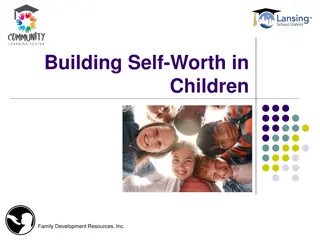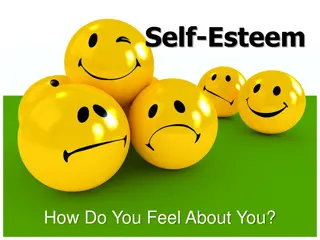
Understanding the Psychology of Self-Love for Personal Growth
Explore the concept of self-love and its significance in promoting well-being and happiness. Embrace nonjudgmental kindness towards yourself, cultivating peace within. Learn strategies such as positive self-talk, setting boundaries, and surrounding yourself with positivity to enhance self-love.
Download Presentation

Please find below an Image/Link to download the presentation.
The content on the website is provided AS IS for your information and personal use only. It may not be sold, licensed, or shared on other websites without obtaining consent from the author. If you encounter any issues during the download, it is possible that the publisher has removed the file from their server.
You are allowed to download the files provided on this website for personal or commercial use, subject to the condition that they are used lawfully. All files are the property of their respective owners.
The content on the website is provided AS IS for your information and personal use only. It may not be sold, licensed, or shared on other websites without obtaining consent from the author.
E N D
Presentation Transcript
The Pop-Psychology of Self Love Self-love regard for one's own well-being and happiness (chiefly considered as a desirable rather than narcissistic characteristic). (New Oxford American Dictionary)
The Pop-Psychology of Self Love What it Really Means to Love Yourself, John Amodeo Ph.D., MFT (psychologytoday.com) Self-love means finding peace within ourselves resting comfortably within the depths of our being. this is simply a way of being nonjudgmentally kind, present, and mindful toward whatever we happen to be experiencing. We need to have empathy and unconditional positive regard for whatever we are experiencing inside.
The Pop-Psychology of Self Love What it Really Means to Love Yourself, John Amodeo Ph.D., MFT (psychologytoday.com) This gentle way of being with ourselves is an antidote to shame. Rather than battling ourselves or trying to fix or change ourselves, we find more inner peace by simply being with our experience as it unfolds.
The Pop-Psychology of Self Love What Self-Love Truly Means and Ways to Cultivate It, Allaya Cooks-Campbell (betterup.com) Contrary to what you might ve heard growing up, fishing for compliments isn t a bad thing. One wonderful habit I got from a course was to respond [to a compliment] with Thank you, it s true.
The Pop-Psychology of Self Love What Self-Love Truly Means and Ways to Cultivate It, Allaya Cooks-Campbell (betterup.com) The way you speak to yourself significantly influences your self-perception and overall well-being. Incorporating positive self-talk and affirmations into your daily routine is a powerful strategy for enhancing self-love. Replace negative statements with positive affirmations that emphasize your strengths, capabilities, and inherent worth. Additionally, surround yourself with positive influences, whether through supportive friends, motivational literature, or affirming podcasts.
The Pop-Psychology of Self Love What Self-Love Truly Means and Ways to Cultivate It, Allaya Cooks-Campbell (betterup.com) Establishing and maintaining healthy boundaries is a crucial aspect of self-love. Surround yourself with individuals who respect and support your boundaries.
The Pop-Psychology of Self Love Loving Yourself: Why and How to Do It, TchikiDavis, MA, PhD (berkeleywellbeing.com) When we love ourselves, we have an appreciation for our own worth or value. We don t need affirmation from others and we don t need them to tell us that we are enough, smart enough, attractive enough we simply know. Self kindness involves being patient with the aspects of your personality that you don t like, being caring towards yourself when you re going through a hard time, and being tolerant of your flaws. Need for forgiveness of self.
The Pop-Psychology of Self Love Loving Yourself: Why and How to Do It, TchikiDavis, MA, PhD (berkeleywellbeing.com) Quotes offered: Owning our story and loving ourselves through that process is the bravest thing that we ll ever do. Brene Brown If you re searching for that one person that will change your life, take a look in the mirror. Unknown
The worlds view of self-love is: Highly subjective (cf. Jeremiah 10:23; Proverbs 14:12) Insular ignorant of or uninterested in cultures, ideas, or peoples outside one's own experience (cf. Psalm 139:17, 23- 24; Galatians 6:6) Self-aggrandizing(cf. Proverbs 6:16-17; James 4:6) Contrary to true introspection (cf. 2 Corinthians 13:5) Small in aim (cf. Mark 8:34, 36; Revelation 2:10) Blasphemous(cf. John 6:68-69) Worldly Self-Love is Condemned (2 Timothy 3:1-5)
God Commands Self-Love (Matthew 22:39; Leviticus 19:18; Ephesians 5:28-29) True self-love is rooted in faith that accepts one is made in God s image. (Genesis 1:26-27; Psalm 139:14; 8:3-9; Acts 17:26-28; Ecclesiastes 1:2; 12:6-8, 13) True self-love is not reached through the knowledge of oneself, but through the knowledge of Christ. (Jeremiah 10:23; Proverbs 14:12; Jeremiah 6:14-21; John 11:9-10; 12:35-36; Galatians 2:20)
God Commands Self-Love (Matthew 22:39; Leviticus 19:18; Ephesians 5:28-29) True self-love is reflected in our love for others. (Matthew 22:39; Luke 10:25-37; Romans 13:8-10)






















